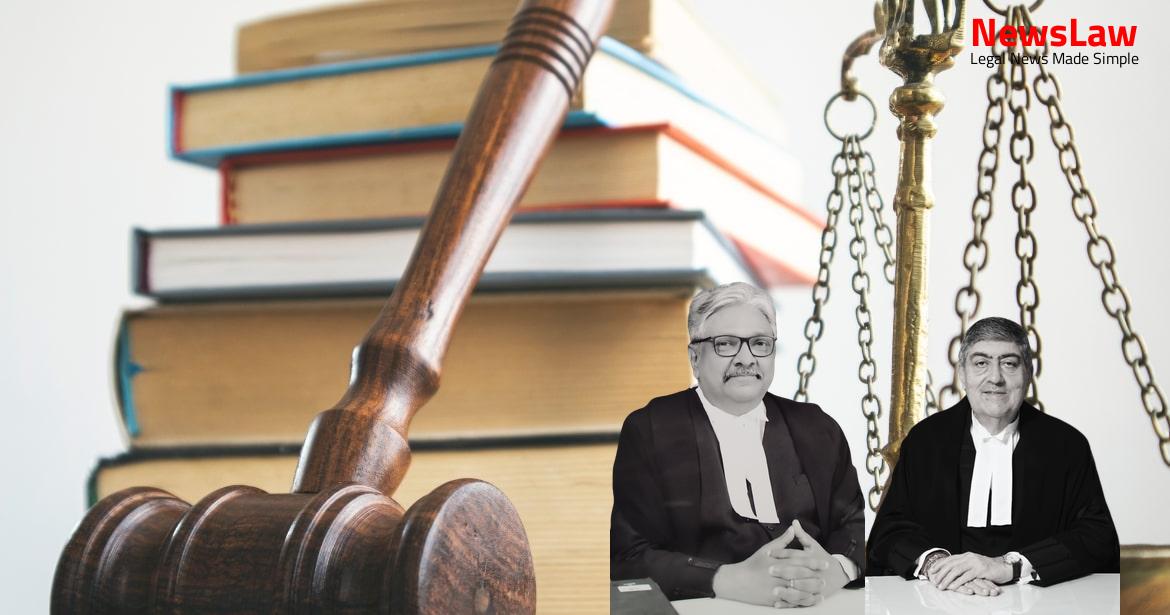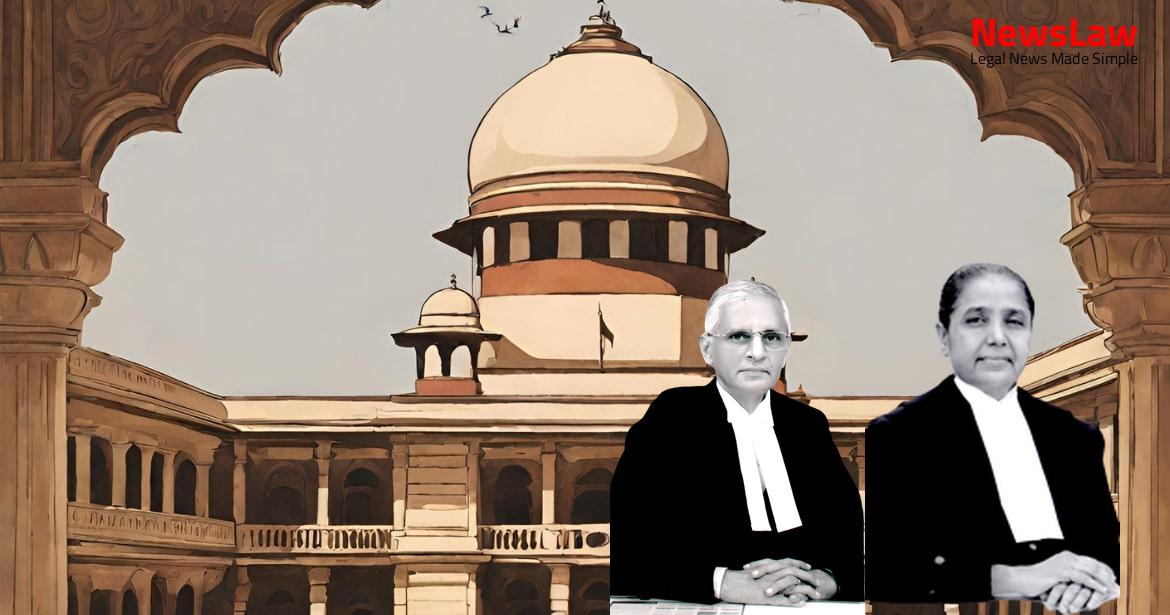Unravel the intricate legal intricacies surrounding a specific performance case as the court grapples with the fundamental concept of readiness and willingness. The court’s analysis sheds light on the pivotal factors that determine the entitlement to specific performance, delving into the parties’ obligations and the implications of their actions. Join us as we dissect the court’s judgment and explore the legal intricacies at play.
Facts
- Defendant feeling aggrieved by the High Court’s decision to allow the appeal and decree the suit for specific performance
- The High Court quashed and set aside the judgment and decree of the Trial Court
- The original defendant has filed Civil Appeal No 6014 of 2021 against the High Court’s order
- The defendant expresses dissatisfaction with the impugned judgment and order of the High Court
- Defendant was required to evict tenants and execute the sale deed upon receiving full sale consideration.
- Agreement for sale was made for a property in Kaspa Coimbatore for Rs. 16.20 lakhs.
- Plaintiff sent legal notice asking defendant to evict tenants and execute sale deed.
- Plaintiff filed suit for specific performance as defendant did not comply.
- Plaintiff was ready with funds in savings account to perform his part.
- Defendant contested suit, denying plaintiff’s readiness and willingness.
- Defendant claimed vacant possession was given and plaintiff was not ready to pay remaining consideration.
- Defendant filed review application which was rejected, leading to the present Civil Appeal No. 6015 of 2021.
- Part sale consideration of Rs. 3,60,001/- was paid at the time of agreement execution.
- Certain conditions were stipulated in the agreement to sell.
Also Read: Judicial Review of Delayed Writ Petition
Issue
- Plaintiff’s entitlement for specific performance was a key issue in the trial.
- The readiness and willingness of the plaintiff to purchase the property was a crucial point of contention.
- The primary focus of this issue was to determine whether the plaintiff met the required conditions for specific performance.
- The court needed to establish if specific performance was the appropriate remedy for the plaintiff.
- The decision on this issue would impact the final relief granted to the plaintiff.
Also Read: Interpretation of Statutory Limitation under Section 263(2)
Arguments
- The petitioner, in this case, argues that the defendant has failed to return the part consideration paid along with interest, despite being directed by the Trial Court.
- The petitioner claims that allowing the suit for specific performance would be unfair as the defendant did not fulfill their part of evicting the tenants.
- The High Court’s decision to permit the defendant to file an affidavit stating willingness to execute the sale deed with tenants is contested by the petitioner.
- The Trial Court’s findings favored the petitioner on readiness but concluded that the plaintiff was not willing to proceed with purchasing the property alongside the tenants.
- The Trial Court dismissed the suit for specific performance and directed the defendant to refund the advance amount with interest.
- The High Court’s decision to rely on the plaintiff’s affidavit, contrary to the pleadings in the plaint, is strongly opposed by the petitioner.
- The respondent’s counsel submits an alternative argument
- Suggests remitting the matter to the High Court for fresh consideration
- Proposes allowing the plaintiff to amend the plaint under Order VI Rule 17 of the CPC
Also Read: Legal Analysis on Conviction Based on Sole Testimony of Prosecutrix
Analysis
- The High Court disposed of the appeal under Order XLI CPC in a casual manner without proper consideration.
- The plaintiff must prove both readiness and willingness for a decree of specific performance.
- Relying on an affidavit without amending the plaint is impermissible.
- The appellate court must give reasons for its decision independently of the trial court.
- The High Court failed to re-appreciate the evidence and did not exercise its jurisdiction as a First Appellate Court.
- The High Court’s judgment showed non-compliance with procedural requirements under Order XLI Rule 31 CPC.
- The plaintiff’s insistence on vacant possession before sale deed execution was significant.
- The High Court did not address all issues and evidence, leading to the unsustainability of its judgment.
- The High Court overlooked the plaintiff’s lack of willingness in the case.
- The appellate court must reflect a conscious application of mind and provide reasons for its findings.
- In the case of B.V. Nagesh and Anr. (supra), it was observed that the First Appellate Court cannot dispose of the first appeal under Section 96 CPC without framing points for determination, considering both facts and law, and without proper discussion and assigning reasons.
- The Court emphasized the importance of raising points for determination as provided under Order XLI Rule 31 CPC for a proper disposal of the first appeal.
- Emmsons International Limited and Anr. (supra) highlighted the duty of the Appellate Court to deal with all issues and evidence led by the parties before recording its findings when sitting as a Court of First Appeal.
- The case of H. Siddiqui (Dead) by LRs. (supra) provided guidelines for the appellate court on how to proceed and decide the case, emphasizing the importance of following the provisions in deciding a regular first appeal.
- Points for determination
- Decision on the points
- Reasons for the decision
- Relief to which the appellant is entitled if the decree is reversed or varied
- The duty was cast upon the defendant to evict tenants and handover vacant possession, which they failed to do.
- Readiness and willingness need to be established and proved for passing a decree for specific performance.
- Non-refunding of part sale consideration by the defendant cannot be a ground to confirm the judgment.
- The plaintiff could have filed an execution petition to execute the judgment/decree passed by the Trial Court.
Decision
- Plaintiff is compensated by awarding 18% interest.
- Pending applications are disposed of.
- Impugned judgment and order by the High Court of judicature at Madras in Appeal Suit No 94 of 2010 is quashed and set aside.
- Judgment and decree passed by the Trial Court stands restored.
- Appellant directed to refund Rs.3,60,001/- with 18% interest from the date of agreement till realization within eight weeks.
- Appeals allowed with no order as to costs.
- Appellant directed to refund Rs.3,60,001/- with 18% interest from the date of agreement till realization within eight weeks.
Case Title: K. KARUPPURAJ Vs. M. GANESAN (2021 INSC 610)
Case Number: C.A. No.-006014-006015 / 2021



